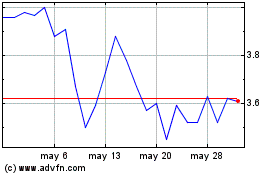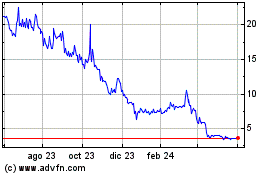NuCana Presents Data at the AACR 2024 Annual Meeting Highlighting the Ability of NUC-7738 to Profoundly Alter Tumor Biology in a Paired Biopsy Clinical Study
09 Abril 2024 - 3:30PM

NuCana plc (NASDAQ: NCNA) announced two posters being presented
today at the American Association of Cancer Research (AACR) Annual
Meeting.
Title: Exposing the Heterogeneity of the
Lipidome in the TME of Cutaneous Melanoma Following Treatment with
NUC-7738 in Combination with anti-PD-1 Therapy
Presentation date and time: April 9, 2024 from
1:30pm-5:00pm PDTAbstract number:
6222
The tumor microenvironment (TME) is a complex
interplay of various cell types, extracellular matrix, signalling
molecules and physical factors that collectively influence tumor
growth. Lipids play an important role in the TME, contributing to
various aspects of cancer progression and therapy resistance. A
novel methodology, including imaging mass spectrometry, was
developed to investigate the spatial relationship between the
lipidome and TME using paired biopsies from patients treated with
NUC-7738. NUC-7738 was found to increase polyunsaturated fatty
acids within the TME, which is indicative of a shift to a less
aggressive cancer type and to decrease monounsaturated fatty acids
which are associated with malignant behavior and chemotherapy
resistance. In addition, NUC-7738 was shown to reduce lipids
associated with protection against cancer cell death and to
increase lipids associated with cancer cell death. Multi-modal
imaging indicated that this lipid reprogramming is a result of the
alteration in enzymes associated with lipid metabolism.
Title: RNA Regulatory Disruption by
3’-dATP: A Novel Approach to Inhibit Ribosome Biogenesis in
CancerPresentation date and time: April 9, 2024
from 1:30pm-5:00pm PDTAbstract number:
5650
Ribosome biogenesis is a complex process that
plays a pivotal role in protein translation which can become
dysregulated in cancer. Thus, ribosome targeting therapies are an
attractive treatment modality for anti-cancer medicines. This study
investigates the impact of NUC-7738, which generates high
intracellular levels of the active anti-cancer metabolite
3’-deoxyadenosine triphosphate (3’-dATP), on the generation of
mRNAs and proteins associated with ribosome biogenesis. Data from
cancer cell lines, confirmed using paired biopsies of patients
treated with NUC-7738, demonstrated that NUC-7738 significantly
modulated the levels of RNAs which are important for translational
control of protein synthesis. Furthermore, data also highlight
NUC-7738’s potential to influence the regulation of genes critical
for cancer cell growth and survival.
Hugh S. Griffith, NuCana’s Founder and Chief
Executive Officer said: “We are excited to present these results as
we believe they demonstrate NUC-7738’s multi-faceted mechanisms of
action. They also further explain the compelling clinical data we
have generated with NUC-7738 as a monotherapy and in combination
with pembrolizumab. We recently presented clinical data from the
ongoing NuTide:701 study of NUC-7738 in combination with
pembrolizumab which demonstrated that NUC-7738 may potentiate the
activity of pembrolizumab in patients who were refractory to PD-1
inhibitor-based therapy. Our translational data help us to
understand these clinical observations and guide the optimal
development pathway for NUC-7738. We look forward to sharing
additional data for NUC-7738 in 2024.”
About NuCanaNuCana is a
clinical-stage biopharmaceutical company focused on significantly
improving treatment outcomes for patients with cancer by applying
our ProTide technology to transform some of the most widely
prescribed chemotherapy agents, nucleoside analogs, into more
effective and safer medicines. While these conventional agents
remain part of the standard of care for the treatment of many solid
and hematological tumors, they have significant shortcomings that
limit their efficacy and they are often poorly tolerated. Utilizing
our proprietary technology, we are developing new medicines,
ProTides, designed to overcome the key limitations of nucleoside
analogs and generate much higher concentrations of anti-cancer
metabolites in cancer cells. NuCana’s pipeline includes NUC-3373
and NUC-7738. NUC-3373 is a new chemical entity derived from the
nucleoside analog 5-fluorouracil, a widely used chemotherapy agent.
NUC-3373 is currently being evaluated in three ongoing clinical
studies: a Phase 1b/2 study (NuTide:302) in combination with
leucovorin, irinotecan or oxaliplatin, and bevacizumab in patients
with metastatic colorectal cancer; a randomized Phase 2 study
(NuTide:323) in combination with leucovorin, irinotecan, and
bevacizumab for the second-line treatment of patients with advanced
colorectal cancer; and a Phase 1b/2 modular study (NuTide:303) of
NUC-3373 in combination with the PD-1 inhibitor pembrolizumab for
patients with advanced solid tumors and in combination with
docetaxel for patients with lung cancer. NUC-7738 is a
transformation of 3’-deoxyadenosine, a novel anti-cancer nucleoside
analog. NUC-7738 is in the Phase 2 part of a Phase 1/2 study in
patients with advanced solid tumors which is evaluating NUC-7738 as
a monotherapy and in combination with pembrolizumab.
Forward-Looking StatementsThis
press release may contain “forward-looking” statements within the
meaning of the Private Securities Litigation Reform Act of 1995
that are based on the beliefs and assumptions and on information
currently available to management of NuCana plc (the “Company”).
All statements other than statements of historical fact contained
in this press release are forward-looking statements, including
statements concerning the Company’s planned and ongoing clinical
studies for the Company’s product candidates and the potential
advantages of those product candidates, including NUC-3373 and
NUC-7738; the initiation, enrollment, timing, progress, release of
data from and results of those planned and ongoing clinical
studies; the Company’s goals with respect to the development,
regulatory pathway and potential use, if approved, of each of its
product candidates; and the utility of prior non-clinical and
clinical data in determining future clinical results. In some
cases, you can identify forward-looking statements by terminology
such as “may,” “will,” “should,” “expects,” “plans,” “anticipates,”
“believes,” “estimates,” “predicts,” “potential” or “continue” or
the negative of these terms or other comparable terminology.
Forward-looking statements involve known and unknown risks,
uncertainties and other factors that may cause the Company’s actual
results, performance or achievements to be materially different
from any future results, performance or achievements expressed or
implied by the forward-looking statements. These risks and
uncertainties include, but are not limited to, the risks and
uncertainties set forth in the “Risk Factors” section of the
Company’s Annual Report on Form 20-F for the year ended December
31, 2023 filed with the Securities and Exchange Commission (“SEC”)
on March 20, 2024, and subsequent reports that the Company files
with the SEC. Forward-looking statements represent the Company’s
beliefs and assumptions only as of the date of this press release.
Although the Company believes that the expectations reflected in
the forward-looking statements are reasonable, it cannot guarantee
future results, levels of activity, performance or achievements.
Except as required by law, the Company assumes no obligation to
publicly update any forward-looking statements for any reason after
the date of this press release to conform any of the
forward-looking statements to actual results or to changes in its
expectations.
For more information, please contact:NuCana
plcHugh S. GriffithChief Executive Officer T: +44 131-357-1111 E:
info@nucana.com
ICR WestwickeChris BrinzeyT: +1 339-970-2843E:
chris.brinzey@westwicke.com
NuCana (NASDAQ:NCNA)
Gráfica de Acción Histórica
De Nov 2024 a Dic 2024

NuCana (NASDAQ:NCNA)
Gráfica de Acción Histórica
De Dic 2023 a Dic 2024
